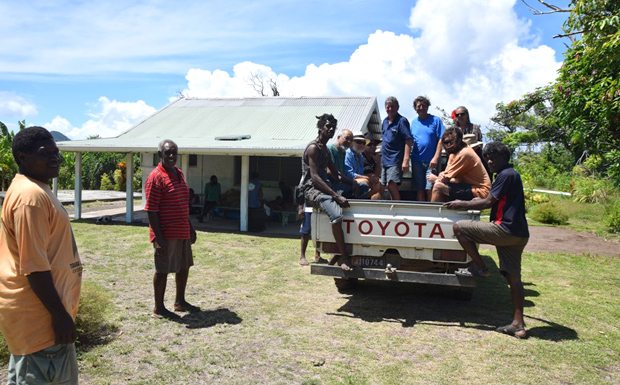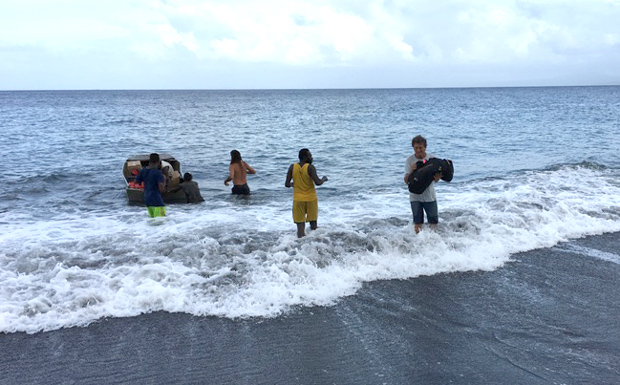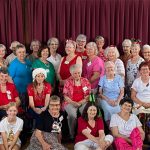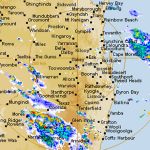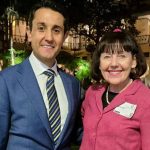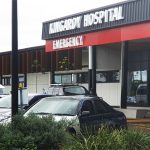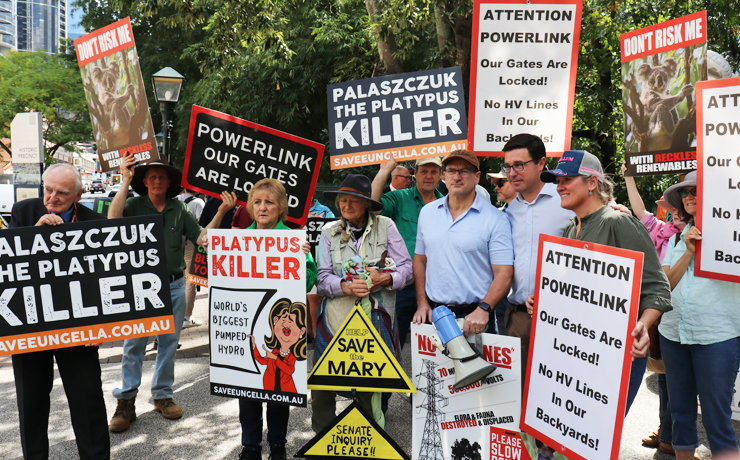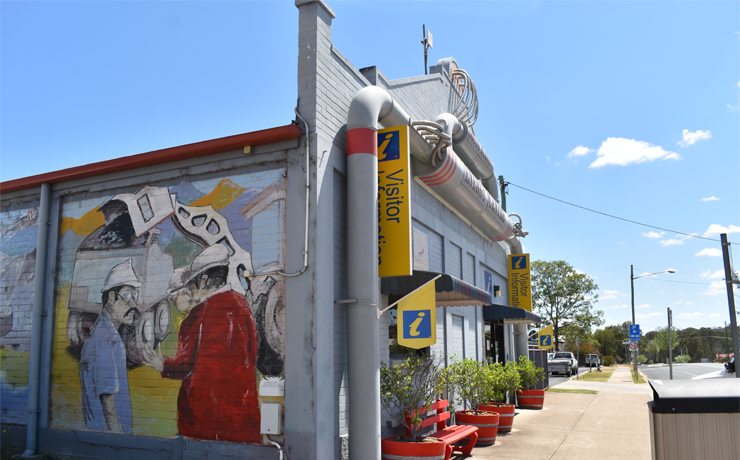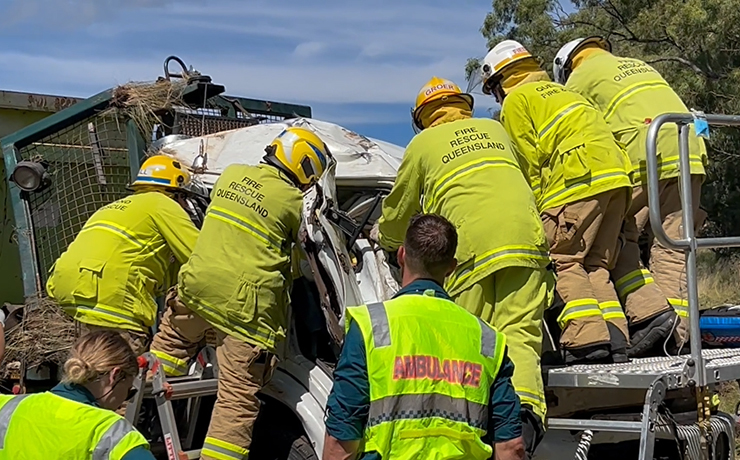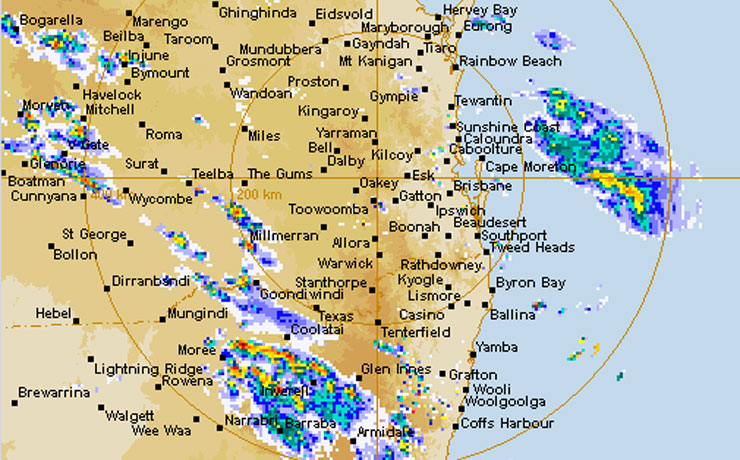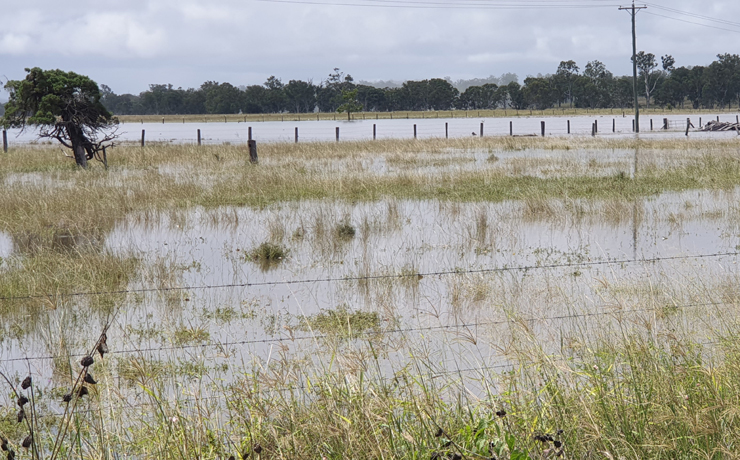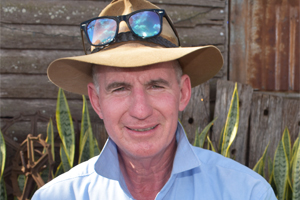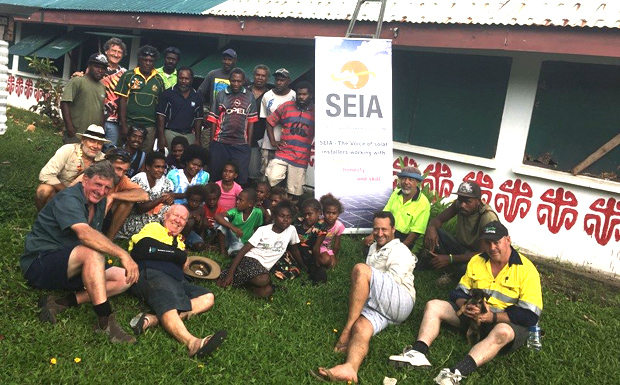
May 20, 2017
by Bronwyn Marquardt
He’s probably best known for his day job, but South Burnett electrician Owen Blamires’ kind heart has made him one of the stars of a new documentary which will be launched in Armidale on Friday night (May 19).
The owner of Wondai Electrical Services is part of an elite team of electricians and solar power specialists who have made several visits to remote islands in Vanuatu to give the gift of electricity to impoverished school children in communities devastated by Cyclone Pam.
More than 70 per cent of people in Vanuatu lost their homes and belongings during the Category Five cyclone which slammed into the islands in 2015, with many schools destroyed.
Those able to stay open were unable to afford the fuel to run generators, which severely impacted on the children whose families could send them to school.
“As a parent and a grandparent, I couldn’t bear to think of those kids missing out on an education when there was something I could do to help,” Owen said.
Owen, 66, made his first trip to the island of Tongoa with son-in-law and colleague Brett Hyde in February 2016.
The pair joined a team of volunteers from the Solar Energy Industries Association (SEIA) who donated their time, tools and airfares to install solar power to three schools on the island.
But it wasn’t a holiday.
Owen and Brett had to fly to Port Vila, then journey 10 hours at night in a converted prawn trawler to get to the island.
They also had to have pre-travel injections, take anti-malaria medication, and provide their own life-jackets and mosquito nets.
Once there, all the materials had to be unloaded the ‘island way’ by hand and transported via a human chain to shore.
The men slept on grass mats beside a chook pen and ate the local diet of mangos, coconuts, and freshly-killed and cooked poultry.
“The conditions on the islands were so basic,” Owen recalls.
“There was no clean water supply or refrigeration. Most people got sick. It really opens up your eyes to how lucky we are in Australia and we felt so grateful to be able to help.
“The people there have so little, but they wanted to give us so much, including food they couldn’t afford to share. The children love to learn and they were so grateful to have light and electricity so they could see and do their work.”
School windows are shuttered close during the day to keep out the heat, which means children do not have light to see the blackboard or read from donated books. If money is spent on fuel for generators – which has been selling at about $5 per litre since the cyclone – resources are diverted from education.
The SEIA team installed solar power to three schools on Tongoa, so the children were able to see properly to read and write for the first time.
“Solar power is the obvious choice for the island because it is cheap, sustainable and environmentally-friendly,” Owen said.
“We also taught the locals how to keep it clean and maintain it.”
Brett was also able to hand out books and pencils to the children, which had been collected by students at St John’s Lutheran School, Kingaroy, where his wife Susan is a teacher, and two of his children attend school.
“As a father, it was incredible to see how grateful the children were to receive the things our own kids take for granted,” Brett said.
When their work was done, the volunteers were almost trapped on the island when another cyclone ripped through the region.
Though Fiji copped the major impact, rough seas meant all sea transportation from Tongoa had to be cancelled.
At the last minute, a charter flight to Port Vila was arranged instead.
The volunteers stayed in touch with the Vanuatu schools on their return.
And last July, after hearing St Patrick’s College on Ambae Island was in trouble, Owen joined Michael Reiken of Excel Solar, Toowoomba, on a journey to discover what they needed.
“We found out that not only were they still suffering from Cyclone Pam, but they only had a generator for electricity,” Owen said.
“Because they couldn’t afford the cost of fuel, they could only run the generator for two hours a day.
“They are one of only two schools in the region to offer IT classes, so this clearly impacted on their ability to teach and for the kids to learn. They didn’t even have enough power to run the modem to access the internet.”
The trip also entailed a visit to Espiritu Santo Island to source as many materials as possible from the island’s only hardware store.
A group of SEIA volunteers returned to Vanuatu in November, this time to Ambae to rescue Saint Patrick’s College.
A flight and 12-hour night barge trip was involved, and the team again paid for their own travel expenses and donated their time.
Owen was joined by employee Kerrod Wenck for the trip.
“We’re all small businesses, mainly family owned and operated, so it’s not easy,” Owen said.
“But it’s a small sacrifice to make when we can make such a difference.
“We were made to feel so welcome, and the principal gave up his home for us to stay in.”
The team installed solar electricity, which can be monitored in Australia, but will be maintained by staff in Vanuatu. It has allowed the children to learn with lights, to use computers, and have access to the internet again.
On this occasion, the volunteer mission was captured on video by SEIA treasurer Rob Taber’s grandson Nick, who has produced a documentary, The Storm That Time Forgot.
The title reflects the fact that after Cyclone Pam, Vanuatu received only three months of international aid, and then was left to struggle.
“Everyone thinks of Vanuatu as an exotic holiday destination, but in fact, most of it is third world,” Owen said.
“They need all the help we can give them. In fact, Nick got very sick from mango poisoning the first night on Ambae, and the staff at the small hospital there did everything they could to get him well. And every village we helped insisted on putting on a feast for us.”
The documentary, in which Owen plays a large part, will be launched at a fundraiser at Armidale on Friday, May 19.
Owen said the SEIA hopes to continue their work to improve conditions and education in Vanuatu, and he personally hopes to bring the fundraising efforts to the South Burnett.
“I think we have a lot to give and there is a lot of ways we can benefit from this relationship,” he says.
